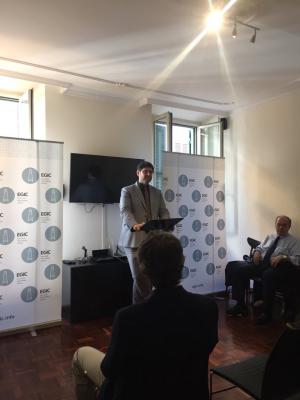EGIC president calls for new strategies in Middle East

ROME - The president of the EGIC Dr. Mitchell Belfer called for people to wake up and “deal with the reality” of what is happening in the Middle East. He called for new strategies to be developed in order to constructively combat the conflict, saying that until now “nothing seems to be working.”
Although the umbrella term of “Middle East” is used, he explained that there are 4 clearly defined regions within it which must be recognised – Arabian Gulf, Levant, North Africa and Northern Tear, and each has a different history and different geopolitical importance.
Nonetheless, Belfer commented on the interconnected nature of the regions in the Middle East, describing the Middle East as a “cold”, as when one part “coughs” another “gets sick.”
He then made the point that society can’t allow itself to fall into the trap of only associating terrorism with Islam, as “today we wrongly tend to associate terrorism with Muslim migrants”, whereas in reality, “Europe has its own experience with secular terrorism.”
He outlined the four main waves of terrorism: Anarchist, Nationalist, Leftist, and Religious. In fact, he explained that religious ideology and its connection to terrorism is a relatively recent one.
When looking and analysing the events in the Middle East, Belfer said we must look at what happens there and how it translates back in Europe, in order to begin to “stop this flow” of terrorism that is sweeping across Europe and the world.
When musing over the possible ways to avoid the destructive path of terrorist activity, Belfer boldly declared that Isolationism is simply not an option, as it is an imagined luxury that simply does not exist. He drew upon Korea to demonstrate this point, saying that it has not and will not achieve true isolationism as it can never escape from economics or its relationship to its neighbouring countries.
He encouraged people to deal with the reality, rather than entertaining the unrealistic, unattainable idea of isolationism.
He posited the question, will the peace that follows the eventual end of the Syrian war be sustainable? He explained the possible problems that could result in the end of the war due to conflicting interests, as despite their mutual interest and motivation now, when the war finishes, Russia’s interests will not line up with Iran’s, and Iran’s will not line up Turkey’s.
With regards to Iran, Belfer described it as a “delicate issue” because of the investment it has received, and as rather than the money going to school projects or rebuilding infrastructure, it has actually gone into Iran’s war machine – a war machine of conventional destruction.
eh


